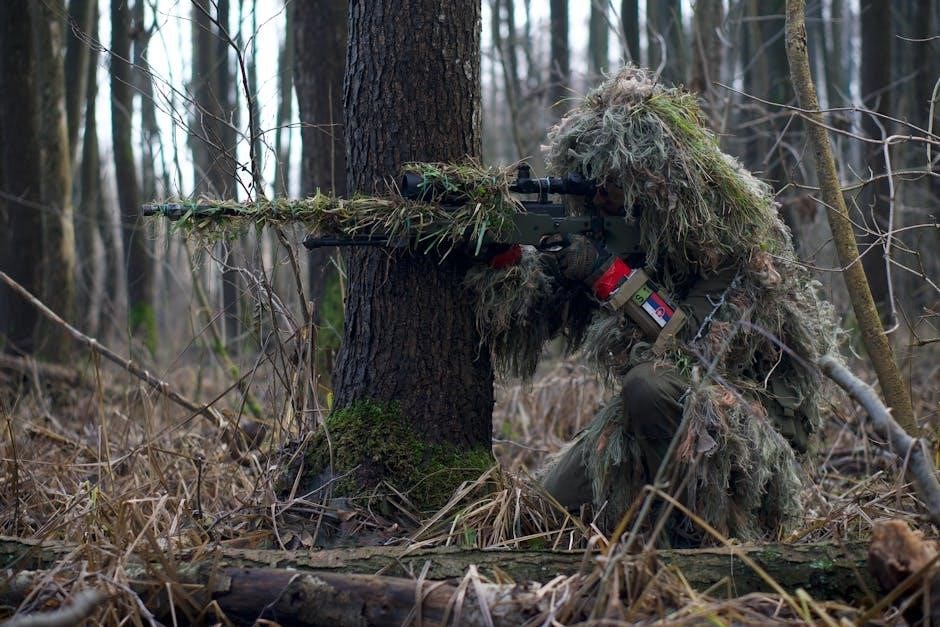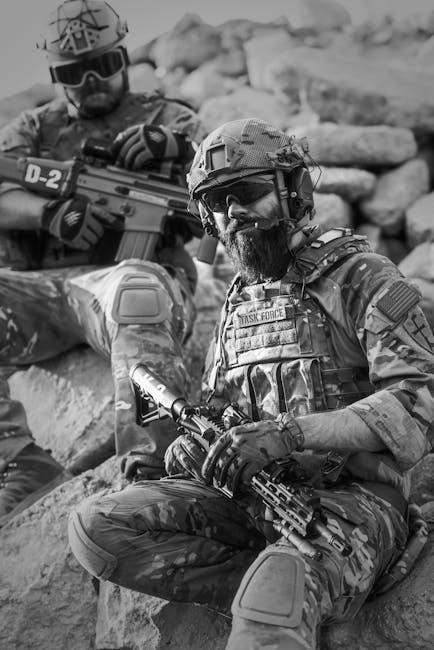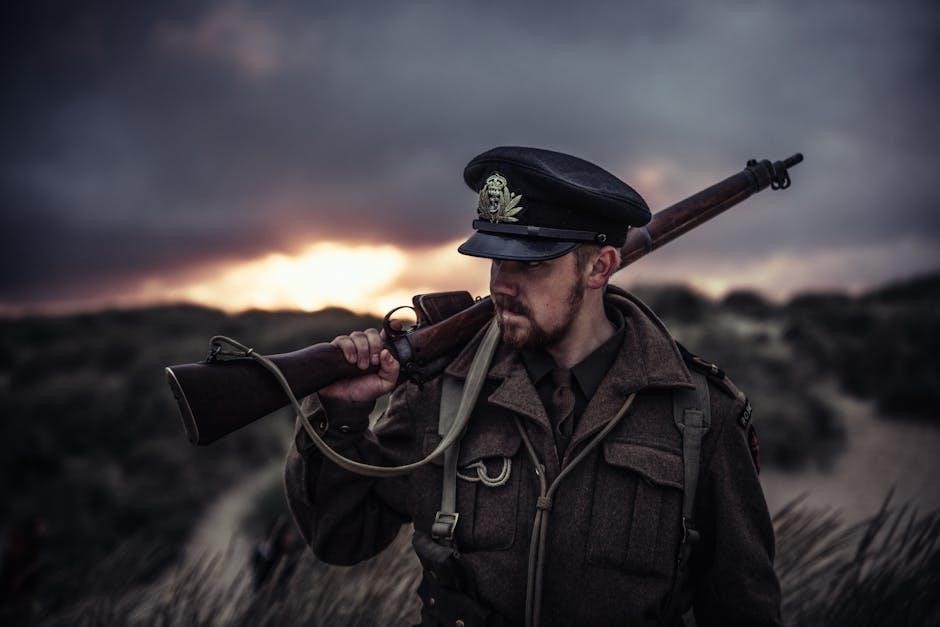The Army NCO Guide (FM 7-22.7) is a comprehensive resource for noncommissioned officers, outlining their duties, responsibilities, and authority. It covers leadership, training, and military justice, serving as a foundation for professional development and success;
1.1 Overview of the NCO Guide (FM 7-22.7)
The NCO Guide (FM 7-22.7) is a comprehensive manual designed to guide noncommissioned officers in leading, supervising, and caring for soldiers. It replaces Training Circular 22-6 and serves as a primary resource for NCOs to understand their roles, responsibilities, and expectations. The guide covers essential topics such as leadership principles, training management, military justice, and professional development. It emphasizes critical thinking, adaptability, and the importance of continuous improvement. The guide also incorporates historical context, highlighting the evolution of the NCO Corps and its significance in the Army’s structure. It is a vital tool for NCOs to succeed in their duties and advance their careers.
1.2 Importance of the NCO Guide for Army NCOs
The NCO Guide is indispensable for Army NCOs, serving as their primary source of guidance for leadership, training, and professional development. It ensures NCOs understand their roles, responsibilities, and expectations, aligning their actions with Army standards. The guide provides foundational knowledge, enabling NCOs to lead effectively, make informed decisions, and adapt to evolving challenges. By standardizing practices, it fosters consistency across units, enhancing overall mission readiness. For NCOs, this guide is a critical tool for meeting Army expectations and achieving success in their roles.
1.3 Historical Context of the NCO Corps
The NCO Corps has a rich history, serving as the backbone of the U.S. Army since its inception. The NCO Corps was formally established during the Revolutionary War, evolving over centuries to become a cornerstone of military leadership. Notable NCOs, such as CSM Gary Litrell and SGT Patrick Glass, have shaped its legacy. Their contributions highlight the Corps’ critical role in leading Soldiers and maintaining unit cohesion. The NCO Corps’ history reflects its adaptability and commitment to the Army’s mission, ensuring its continued relevance in modern military operations.
Leadership and Supervision
Leadership and supervision are core competencies for NCOs, focusing on guiding Soldiers, fostering teamwork, and achieving mission goals. Effective techniques ensure unit success and individual growth, emphasizing accountability and mentorship.
2.1 Key Principles of Leadership for NCOs
Key leadership principles for NCOs include leading by example, critical thinking, and accountability. NCOs must inspire trust, communicate clearly, and foster teamwork. They should demonstrate empathy, maintain discipline, and prioritize mission accomplishment. These principles ensure effective guidance, fostering a positive and productive environment. By embodying these values, NCOs build strong relationships with their teams, driving unit success and individual growth. Adherence to these principles is essential for maintaining high standards and achieving organizational goals, ensuring the Army’s continued excellence and readiness.
2.2 Effective Supervision Techniques
Effective supervision involves clear communication, active listening, and regular feedback. NCOs should set clear expectations, monitor progress, and address issues promptly. They must also empower subordinates, fostering a culture of accountability and continuous improvement. By maintaining visibility and approachability, NCOs build trust and ensure tasks are executed efficiently. Utilizing tools like checklists and performance trackers can enhance oversight while maintaining high standards. Effective supervision ensures mission success and supports the professional growth of Soldiers, aligning individual efforts with unit goals. This approach strengthens team cohesion and overall readiness.
2.3 Mentorship and Development of Junior Soldiers
Mentorship is a cornerstone of NCO responsibilities, fostering growth and competence in junior Soldiers. NCOs serve as role models, providing guidance, wisdom, and experience. Effective mentorship involves teaching technical skills, leadership, and Army values. NCOs should create developmental plans tailored to each Soldier’s needs, offering constructive feedback and encouragement. By investing time and effort, NCOs help Soldiers achieve their potential, enhancing unit performance and readiness. This investment strengthens the Army’s future by building a capable and confident force. Mentorship is not just a duty—it’s a commitment to the success and legacy of the NCO Corps.

Professional Development
Professional development for NCOs includes structured programs like NCOES and PME, designed to enhance leadership, technical skills, and critical thinking. These programs ensure NCOs are prepared to lead effectively and contribute to unit readiness.
3.1 NCO Education System (NCOES)
The NCO Education System (NCOES) is a structured program designed to develop leadership and technical skills for Army NCOs. It includes courses such as Basic Leadership Course, Advanced Leadership Course, and Senior Leadership Course. These courses focus on critical thinking, problem-solving, and communication. NCOES ensures that NCOs are prepared to lead soldiers effectively, understand their roles, and contribute to unit readiness. The system is continuously updated to meet evolving challenges and incorporate modern training methods. It plays a crucial role in shaping competent and confident leaders within the Army.
3.2 Professional Military Education (PME)
Professional Military Education (PME) is a cornerstone of NCO development, equipping leaders with advanced knowledge and skills. PME programs, such as the Sergeant Major Course, focus on leadership, tactical expertise, and strategic thinking. These courses ensure NCOs understand their roles, responsibilities, and how to contribute to the Army’s mission. PME also emphasizes adaptability, critical thinking, and problem-solving, preparing NCOs for complex operational environments. The Army is expanding virtual learning options for PME, making it more accessible and efficient. This modern approach ensures NCOs remain competitive and ready to lead in future conflicts.
3.3 Role of the NCO in Training and Development
NCOs play a pivotal role in training and developing soldiers, ensuring they meet Army standards and adapt to evolving challenges. They utilize resources like FM 7-22.7 to guide training practices, focusing on leadership, technical skills, and mission readiness. NCOs mentor junior soldiers, fostering professional growth and resilience. By leveraging tools such as unit training management systems, they track progress and identify areas for improvement. Their hands-on approach ensures soldiers are proficient in their roles, contributing to overall unit effectiveness and preparedness for current and future missions.

Military Justice and Disciplinary Actions
The Army NCO Guide emphasizes adherence to the Uniform Code of Military Justice (UCMJ), outlining NCO roles in counseling, disciplinary procedures, and maintaining order to ensure accountability and fairness.
4.1 Understanding the Uniform Code of Military Justice (UCMJ)
The Uniform Code of Military Justice (UCMJ) is the foundation of military law, governing conduct for all service members. It ensures justice, discipline, and accountability across the Armed Forces; NCOs must understand the UCMJ to enforce standards, address misconduct, and protect Soldiers’ rights. Key aspects include non-judicial punishment (Article 15), court-martial procedures, and reporting requirements. NCOs play a critical role in maintaining order by adhering to and upholding the UCMJ, fostering a culture of compliance and fairness within their units. This knowledge is essential for effective leadership and disciplinary actions.
4.2 NCOs and Counseling Soldiers
Counseling is a critical tool for NCOs to address performance, personal issues, and career development. Effective communication and empathy are essential in fostering trust and understanding. NCOs use counseling to guide Soldiers toward improvement, whether for disciplinary reasons or personal growth. Regular feedback and documentation ensure accountability and progress tracking. This process strengthens unit cohesion and supports Soldier well-being, aligning with the Army’s commitment to developing resilient and capable service members. Counseling is a cornerstone of leadership, enabling NCOs to mentor and empower Soldiers effectively.
4.3 Administrative and Disciplinary Actions
NCOs play a vital role in enforcing military justice through administrative and disciplinary actions. These actions ensure accountability and maintain unit discipline. Administrative measures include counseling, letters of reprimand, and performance evaluations. Disciplinary actions, such as UCMJ proceedings, address more serious misconduct. NCOs must adhere to regulations, ensuring fairness and consistency. Proper documentation and adherence to legal standards are crucial. These actions not only correct behavior but also uphold the Army’s standards, fostering a disciplined and professional force. NCOs must balance firmness with compassion to maintain unit integrity and readiness. Their decisions impact morale and unit effectiveness significantly.
Training and Readiness
Training and readiness are critical for NCOs to ensure unit effectiveness. This section covers strategies for unit training management, physical fitness, and mission preparation, enabling NCOs to build combat-ready teams.
5.1 Unit Training Management
Effective unit training management is essential for ensuring readiness and combat proficiency. NCOs play a pivotal role in planning, executing, and assessing training programs tailored to mission requirements. They utilize resources like FM 7-22.7 to align training objectives with Army standards, fostering a culture of continuous improvement. By leveraging their expertise, NCOs ensure soldiers are adequately prepared for operational demands, emphasizing physical fitness, tactical skills, and teamwork. This section details strategies for scheduling, resourcing, and evaluating training to maximize unit performance and readiness.
5.2 Physical Fitness and Combat Readiness
Physical fitness is a cornerstone of combat readiness, and NCOs play a critical role in ensuring soldiers maintain high standards. The Army NCO Guide emphasizes that physical fitness is essential for mission success, as it directly impacts a soldier’s ability to perform under stress. NCOs lead by example, conducting regular fitness training and monitoring progress. They also ensure soldiers understand the link between physical fitness and mental resilience. By fostering a culture of fitness, NCOs help build units that are mentally tough, physically capable, and ready for deployment. This section highlights strategies for maintaining peak physical condition and combat effectiveness.
5.3 Mission Preparation and Execution
Mission preparation and execution are critical responsibilities for NCOs, ensuring units are ready to achieve objectives. NCOs lead in planning, coordinating resources, and supervising rehearsals. They ensure soldiers understand their roles and are mentally prepared. During execution, NCOs monitor progress, address challenges, and maintain discipline. Post-mission, they conduct debriefs to assess outcomes and identify improvements. The NCO Guide emphasizes the importance of clear communication and decisive action, ensuring seamless mission execution. NCOs are pivotal in translating plans into successful operations, upholding the Army’s standards of excellence and readiness.
Morale and Welfare
NCOs play a vital role in fostering unit morale and ensuring soldiers’ welfare, creating a supportive environment that enhances readiness and overall performance.
6.1 Building Unit Morale
NCOs play a vital role in fostering unit morale by creating a supportive environment that encourages camaraderie and shared purpose. Effective communication, recognition of achievements, and team-building activities help boost spirits. NCOs ensure soldiers feel valued and connected, which strengthens unit cohesion and resilience. By addressing concerns and promoting a positive atmosphere, NCOs directly contribute to high morale, enhancing overall readiness and mission success.
6.2 Supporting Soldiers’ Welfare
NCOs are instrumental in ensuring the well-being of their soldiers by addressing both personal and professional needs. They provide guidance on benefits, health, and financial planning, while also connecting soldiers to resources for stress management and mental health. Regular counseling sessions and open communication help identify and resolve issues early. By advocating for soldiers’ welfare, NCOs create a supportive environment that enhances individual and unit performance, fostering a culture of care and readiness.
6.3 The Role of the NCO in Maintaining Readiness
NCOs play a critical role in ensuring unit readiness by enforcing standards, conducting training, and preparing soldiers for missions. They monitor individual and collective performance, identify gaps, and implement corrective actions. Regular inspections, physical fitness training, and mission rehearsals are key tools NCOs use to maintain proficiency. Additionally, they ensure equipment is operational and that soldiers are mentally and physically prepared. By focusing on these areas, NCOs help build a resilient and capable force ready to execute any mission effectively.

History of the NCO Corps
The NCO Corps is the backbone of the U.S. Army, with a rich history dating back to its establishment. NCOs have consistently played a pivotal role in the Army’s structure and success, earning admiration worldwide for their leadership and professionalism. Their legacy, rooted in duty and excellence, continues to shape the Army’s identity and operational effectiveness. The Corps’ evolution reflects its adaptability and commitment to advancing the Army’s mission historically and into the future.
7.1 The Birth of the NCO Corps
The NCO Corps traces its origins to the early days of the U.S. Army, with noncommissioned officers playing crucial roles since the Revolutionary War. The Corps formally emerged during the 18th century, with sergeants and corporals leading small units and maintaining discipline. Over time, the role of NCOs expanded to include training, leadership, and operational responsibilities. The NCO Corps became the backbone of the Army, ensuring enlisted soldiers were prepared for duty. This foundation laid the groundwork for the modern NCO Corps, which continues to embody leadership and professionalism.
7.2 Notable NCOs in Army History
Throughout U.S. Army history, notable NCOs have left indelible marks on the Corps. Figures like CSM Gary Litrell, SGT Patrick Glass, and SGT Rissler exemplify courage and leadership. Their contributions, from combat heroism to innovative training methods, have shaped the NCO Corps. These individuals embody the values of professionalism and dedication, inspiring future generations of NCOs. Their stories highlight the critical role of enlisted leaders in advancing the Army’s mission and maintaining its legacy of excellence.
7.3 Evolution of NCO Roles and Responsibilities
The roles and responsibilities of NCOs have evolved significantly over time, adapting to the Army’s changing needs. Historically, NCOs focused on basic leadership and discipline, but modern NCOs are expected to be mentors, trainers, and strategic thinkers. Recent updates to the NCO Guide reflect this shift, emphasizing critical thinking, professional development, and the integration of technology. The Corps now prioritizes leadership in complex operational environments, preparing NCOs to address modern challenges while maintaining the foundation of trust and expertise that has always defined their role.
Tools and Resources for NCOs
The NCO Guide provides access to essential tools, including automated applications for team management, training tracking, and digital resources. These tools enhance efficiency and effectiveness in daily operations.
8.1 NCO Tools and Applications
The NCO Guide introduces a suite of tools designed to enhance productivity and efficiency. These include Alpha Roster, a digital platform for managing unit personnel, and CORE NCO Tools, which streamline tasks like training schedules and performance tracking. Automated applications now enable NCOs to generate reports, share information via email or text, and maintain organized records. These tools are integral for modern NCOs, ensuring seamless communication and effective team management. Regular updates and new features ensure these resources remain relevant and adaptable to evolving military needs.
8.2 Utilizing Army Regulations and Field Manuals
The Army NCO Guide emphasizes the importance of utilizing Army regulations and field manuals as foundational resources for NCOs. These documents provide detailed guidelines on leadership principles, training methodologies, and military justice procedures, ensuring NCOs can effectively lead and manage their units. By adhering to these regulations, NCOs maintain discipline and uphold military standards. Regular updates to these manuals reflect evolving military strategies and policies, ensuring NCOs remain informed and effective in their daily duties.
8.3 Digital Tools for Modern NCOs
Modern NCOs leverage advanced digital tools to enhance leadership, training, and mission execution. Platforms like the NCO Business app streamline tasks such as roster management, duty tracking, and communication. Automated tools enable efficient mission planning, training schedules, and performance monitoring. These tools also facilitate real-time collaboration and data sharing, ensuring seamless operations in both garrison and deployed environments. By integrating technology, NCOs can focus on developing Soldiers and achieving mission objectives more effectively, while maintaining alignment with Army regulations and standards.
Communication and Counseling
Effective communication is crucial for NCOs to lead, counsel, and resolve conflicts. Clear dialogue fosters trust and understanding, enabling NCOs to guide Soldiers toward personal and professional growth.
9.1 Effective Communication Skills
Effective communication is a cornerstone of successful leadership for Noncommissioned Officers (NCOs). It involves active listening, clear articulation, and adaptability to diverse audiences. NCOs must tailor their communication style to ensure clarity and understanding, whether conveying orders, providing feedback, or addressing concerns. Strong communication fosters trust, collaboration, and cohesion within units, enabling mission success. By mastering verbal and non-verbal cues, NCOs can inspire confidence, resolve conflicts, and guide Soldiers toward achieving both personal and professional goals. This skill is essential for counseling and fostering a positive command climate.
9.2 Counseling Techniques for Soldiers
Counseling techniques are essential for NCOs to guide Soldiers in personal and professional growth. Active listening, empathy, and clear communication are key. NCOs should create a supportive environment, encouraging Soldiers to express concerns openly. Counselors must remain impartial, focusing on solutions rather than blame. Setting specific, measurable goals helps Soldiers improve performance and achieve success. Regular follow-ups ensure progress and accountability. Effective counseling fosters trust, boosts morale, and strengthens unit cohesion. NCOs must document counseling sessions to track development and provide consistent feedback, empowering Soldiers to take ownership of their growth and contributions to the mission. This builds resilient, capable teams.
9.3 Conflict Resolution Strategies
Conflict resolution is crucial for maintaining unit cohesion and productivity. NCOs should remain impartial, fostering open dialogue to identify root causes. Active listening and empathy help de-escalate tensions, while focusing on solutions rather than blame promotes collaboration. Mediation techniques, such as encouraging mutual understanding and compromise, can resolve disputes effectively. NCOs must document resolutions and provide feedback to prevent future conflicts. By addressing issues promptly and fairly, leaders create a positive environment, ensuring Soldiers remain focused on mission success and teamwork. Effective conflict resolution strengthens trust and readiness within the unit.

The NCO’s Role in Mission Planning
NCOs play a vital role in mission planning by providing tactical expertise and ensuring operational alignment with command intent. They bridge strategy and execution, making informed decisions that enhance mission success.
10.1 Understanding the Planning Process
NCOs must grasp the planning process to effectively contribute to mission success. This involves identifying objectives, analyzing the operational environment, and developing actionable plans; The planning process ensures alignment with command intent and adapts to evolving situations. NCOs play a critical role in translating strategic goals into tactical execution, leveraging their expertise to anticipate challenges and optimize resources. By understanding the planning process, NCOs ensure seamless coordination between units, fostering collaboration and enhancing mission readiness. Their input is essential for creating realistic, achievable, and effective plans.
10.2 NCOs and Operational Planning
NCOs are integral to operational planning, ensuring plans are practical and executable; They bridge strategic goals and tactical execution, providing expertise on unit capabilities and limitations. By analyzing intelligence and mission requirements, NCOs identify potential challenges and propose solutions. Their role involves coordinating with other sections, such as logistics and intelligence, to ensure seamless execution. Effective operational planning by NCOs enhances mission success, fosters unit cohesion, and aligns with command intent. Their hands-on experience and leadership are crucial in transforming plans into decisive action.
10.3 Execution and Assessment of Missions
NCOs play a vital role in executing and assessing missions. They ensure tasks are carried out efficiently, monitoring progress and making adjustments as needed. Post-mission, NCOs conduct thorough assessments to evaluate success and identify areas for improvement. This involves gathering feedback, analyzing performance metrics, and documenting lessons learned. Their insights inform future operations, enhancing overall mission effectiveness. By maintaining accountability and fostering continuous improvement, NCOs contribute to the Army’s operational excellence and readiness for future challenges. Their hands-on involvement ensures missions achieve their intended objectives.
Continuous Improvement
NCOs prioritize self-development, staying updated on professional standards, and adapting to modern challenges. Continuous improvement ensures they remain effective leaders, driving unit performance and readiness in evolving environments.
11.1 Self-Development for NCOs
Self-development is critical for NCOs to enhance leadership skills and stay current with evolving military standards; Through reading Army regulations, field manuals, and military journals, NCOs gain deeper insights into their roles. Additionally, engaging in professional military education and seeking mentorship opportunities fosters personal and professional growth. By prioritizing self-improvement, NCOs become more effective leaders, capable of addressing complex challenges and inspiring their teams to achieve excellence.
11.2 Improving Unit Performance
Improving unit performance requires NCOs to lead by example, fostering a culture of accountability and continuous improvement. By leveraging tools like automated systems and digital applications, NCOs can streamline tasks and enhance efficiency. Effective mission planning, training management, and communication are key to achieving operational excellence. NCOs must also encourage feedback and recognize achievements to motivate soldiers. These strategies ensure units remain adaptable, resilient, and capable of excelling in diverse mission environments, aligning with the Army’s commitment to maintaining a high-performing force.
11.3 Adapting to Modern Challenges
NCOs must adapt to evolving challenges by embracing technological advancements and innovative strategies. The integration of automated tools and virtual platforms enhances operational efficiency and readiness. Modern NCOs are encouraged to pursue continuous education and professional development to stay ahead of emerging threats. Critical thinking and problem-solving skills are essential for addressing complex scenarios. By fostering a culture of innovation and resilience, NCOs ensure their units remain agile and prepared for future conflicts. This proactive approach aligns with the Army’s vision of maintaining a competitive edge in a rapidly changing world.
The Future of NCO Development
The future of NCO development focuses on integrating technology, enhancing professional education, and fostering adaptability to meet emerging challenges, ensuring NCOs remain leaders in modern military operations.
12.1 Emerging Trends in NCO Education
Emerging trends in NCO education emphasize virtual learning platforms and accredited degree programs. The Army is shifting NCO academies to online formats, scaling back temporary promotions, and aligning education with promotion requirements. These changes aim to enhance critical thinking and adaptability, ensuring NCOs meet future challenges effectively. The integration of technology and modernized curricula reflects the Army’s commitment to evolving the NCO Corps into a more agile and educated force.
12.2 The Role of Technology in NCO Development
Technology is revolutionizing NCO development through automated tools, virtual learning, and digital resources. The Army is implementing apps for task management, roster tracking, and mission planning. Virtual platforms enable remote professional development, expanding access to education. These innovations enhance efficiency, adaptability, and readiness, ensuring NCOs are equipped to lead in a rapidly changing environment. Technology integration is a cornerstone of modern NCO development, fostering a more agile and technologically proficient force capable of addressing future challenges effectively.
12.3 Preparing NCOs for Future Conflicts
The Army is evolving its NCO development strategy to prepare leaders for future conflicts. The NCO Corps, established in 1775, remains the backbone of the Army, with the NCO Guide (FM 7-22.7) serving as a foundational resource. NCOs are being trained to think critically and adapt to modern challenges, ensuring they can lead in dynamic environments. Emerging trends include virtual learning, automated tools, and a focus on innovation. The integration of technology and updated curricula in the NCO Education System is equipping leaders with the skills needed to succeed in future operations, ensuring the NCO Corps remains relevant and effective.